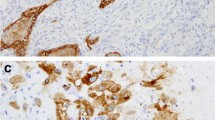Abstract
We herein report the case of a patient with Li-Fraumeni syndrome (LFS) who developed lung pleomorphic carcinoma. A 28-year-old female patient with a family history of early-onset malignancies was diagnosed with lung carcinoma and treated by surgical resection. Histological examination revealed a heterogeneous tumor with epithelial and mesenchymal components. The final pathological diagnosis was pulmonary pleomorphic carcinoma. In this patient, a constitutional mutation at codon 213 in exon 6 of the p53 gene was identified in the peripheral lymphocytes and the resected tumor, and LFS was suspected. This mutation causes a nonsense mutation (Arg-to-Stop codon) that has been shown to attenuate p53 function. This is the first report of pulmonary pleomorphic carcinoma developing in an LFS patient, and may suggest a relationship between germline p53 mutation and carcinogenesis in pulmonary pleomorphic carcinoma.
Similar content being viewed by others
References
Li FP, Fraumeni JF Jr. Soft-tissue sarcomas, breast cancer, and other neoplasms. A familial syndrome? Ann Intern Med 1969;71:747–752.
Li FP, Fraumeni JF Jr. Rhabdomyosarcoma in children: epidemiologic study and identification of a familial cancer syndrome. J Natl Cancer Inst 1969;43:1365–1373.
Malkin D, Li FP, Strong LC, Fraumeni JF Jr, Nelson CE, Kim DH, et al. Germ line p53 mutations in a familial syndrome of breast cancer, sarcomas, and other neoplasms. Science 1990;250:1233–1238.
Hwang SJ, Cheng LS, Lozano G, Amos CI, Gu X, Strong LC. Lung cancer risk in germline p53 mutation carriers: association between an inherited cancer predisposition, cigarette smoking, and cancer risk. Hum Genet 2003;113:238–243.
Travis WD, Colby TV, Corrin B, Shimosato Y, Brambilla E, Sobin LH. Histological typing of lung and pleural tumours. 3rd ed. Berlin Heidelberg New York: Springer; 1999.
Davis MP, Eagan RT, Weiland LH, Pairolero PC. Carcinosarcoma of the lung: Mayo Clinic experience and response to chemotherapy. Mayo Clin Proc 1984;59:598–603.
Ishida T, Tateishi M, Kaneko S, Yano T, Mitsudomi T, Sugimachi K, et al. Carcinosarcoma and spindle cell carcinoma of the lung. Clinicopathologic and immunohistochemical studies. J Thorac Cardiovasc Surg 1990;100:844–852.
Shi B, Gaebelein G, Hildebrandt B, Weichert W, Glanemann M. Adult jejunojejunal intussusception caused by metastasized pleomorphic carcinoma of the lung: report of a case. Surg Today 2009;39:984–989.
The World Health Organization histological typing of lung tumours. Second edition. Am J Clin Pathol 1982;77:123–136.
WHO. International histological classification of tumours. 3rd ed. Geneva: World Health Organization; 1999.
Fishback NF, Travis WD, Moran CA, Guinee DG Jr, McCarthy WF, Koss MN. Pleomorphic (spindle/giant cell) carcinoma of the lung. A clinicopathologic correlation of 78 cases. Cancer 1994;73:2936–2945.
Krefting IP, Nunez LA, Sherer P, Weinstock A, Kumar A, Travis W. Pleomorphic carcinoma (spindle and giant cell) of the lung. Md Med J 1994;43:787–790.
Przygodzki RM, Koss MN, Moran CA, Langer JC, Swalsky PA, Fishback N, et al. Pleomorphic (giant and spindle cell) carcinoma is genetically distinct from adenocarcinoma and squamous cell carcinoma by K-ras-2 and p53 analysis. Am J Clin Pathol 1996;106:487–492.
Wick MR, Ritter JH, Humphrey PA. Sarcomatoid carcinomas of the lung: a clinicopathologic review. Am J Clin Pathol 1997;108:40–53.
Nakajima M, Kasai T, Hashimoto H, Iwata Y, Manabe H. Sarcomatoid carcinoma of the lung: a clinicopathologic study of 37 cases. Cancer 1999;86:608–616.
Wu CC, Shete S, Amos CI, Strong LC. Joint effects of germ-line p53 mutation and sex on cancer risk in Li-Fraumeni syndrome. Cancer Res 2006;66:8287–8292.
Varley JM. Germline TP53 mutations and Li-Fraumeni syndrome. Hum Mutat 2003;21:313–320.
Li FP, Fraumeni JF Jr, Mulvihill JJ, Blattner WA, Dreyfus MG, Tucker MA, et al. A cancer family syndrome in twenty-four kindreds. Cancer Res 1988;48:5358–5362.
Horio Y, Suzuki H, Ueda R, Koshikawa T, Sugiura T, Ariyoshi Y, et al. Predominantly tumor-limited expression of a mutant allele in a Japanese family carrying a germline p53 mutation. Oncogene 1994;9:1231–1235.
Schuyer M, Henzen-Logmans SC, van der Burg ME, Fieret EJ, Klijn JG, Foekens JA, et al. High prevalence of codon 213Arg->Stop mutations of the TP53 gene in human ovarian cancer in the southwestern part of The Netherlands. Int J Cancer 1998;76:299–303.
Chiba I, Takahashi T, Nau MM, D’Amico D, Curiel DT, Mitsudomi T, et al. Mutations in the p53 gene are frequent in primary, resected non-small cell lung cancer. Lung Cancer Study Group. Oncogene 1990;5:1603–1610.
Sameshima Y, Matsuno Y, Hirohashi S, Shimosato Y, Mizoguchi H, Sugimura T, et al. Alterations of the p53 gene are common and critical events for the maintenance of malignant phenotypes in small-cell lung carcinoma. Oncogene 1992;7:451–457.
Arita N, Mikami Y, Yoshida M, Konishi I, Horiike N, Miyauchi K, et al. Pleomorphic carcinoma of the lung associated with loss of heterozygosity of p53 gene. Tohoku J Exp Med 2005;206:181–185.
Varley JM, Evans DG, Birch JM. Li-Fraumeni syndrome — a molecular and clinical review. Br J Cancer 1997;76:1–14.
Izawa N, Matsumoto S, Manabe J, Tanizawa T, Hoshi M, Shigemitsu T, et al. A Japanese patient with Li-Fraumeni syndrome who had nine primary malignancies associated with a germline mutation of the p53 tumor-suppressor gene. Int J Clin Oncol 2008;13:78–82.
Heyn R, Haeberlen V, Newton WA, Ragab AH, Raney RB, Tefft M, et al. Second malignant neoplasms in children treated for rhabdomyosarcoma. Intergroup Rhabdomyosarcoma Study Committee. J Clin Oncol 1993;11:262–270.
Limacher JM, Frebourg T, Natarajan-Ame S, Bergerat JP. Two metachronous tumors in the radiotherapy fields of a patient with Li-Fraumeni syndrome. Int J Cancer 2001;96:238–242.
Felix CA, Hosler MR, Provisor D, Salhany K, Sexsmith EA, Slater DJ, et al. The p53 gene in pediatric therapy-related leukemia and myelodysplasia. Blood 1996;87:4376–4381.
Author information
Authors and Affiliations
Rights and permissions
About this article
Cite this article
Kato, T., Ishikawa, K., Satoh, M. et al. Pleomorphic carcinoma of the lung arising in a patient with Li-Fraumeni syndrome: Report of a case. Surg Today 41, 841–845 (2011). https://doi.org/10.1007/s00595-010-4359-0
Received:
Accepted:
Published:
Issue Date:
DOI: https://doi.org/10.1007/s00595-010-4359-0




